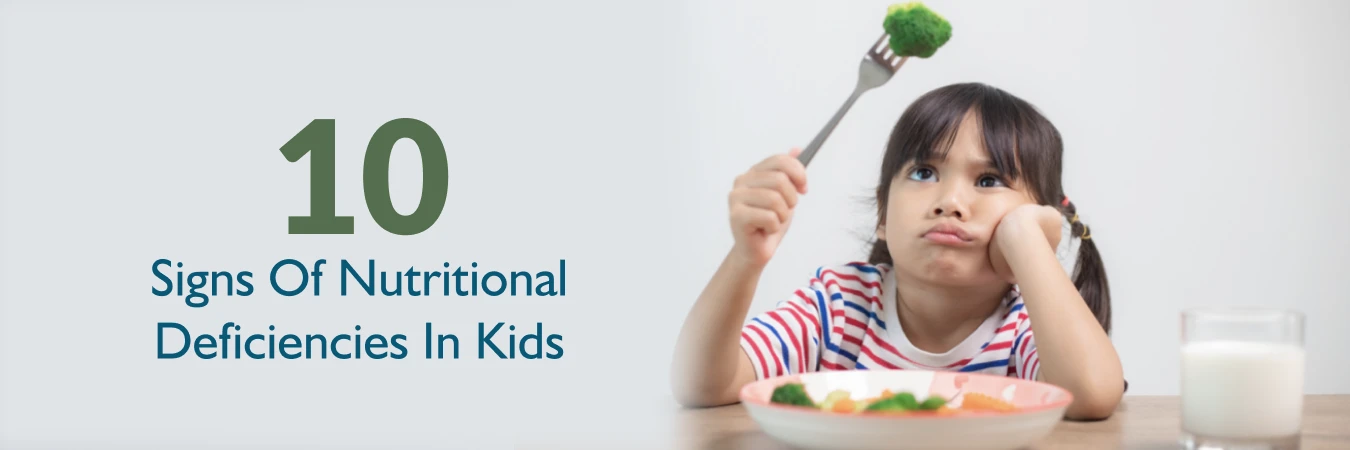- Cardiology 84
- Dermatology 45
- Endocrinology 33
- ENT 16
- Fertility 190
- Gastroenterology 78
- General-Medicine 81
- Gynecology 80
- Hematology 19
- Infectious-Diseases 33
- Neurology 52
- Oncology 34
- Ophthalmology 23
- Orthopedics 69
- Pediatrics 31
- Procedure 23
- Public-Health 144
- Pulmonology 59
- Radiology 8
- Urology 68
- Wellness 161
- Woman-and-child 77

Understanding Nutritional Deficiencies in Children
Parents do everything to give the best for their children, right? And probably you are the one among them. Even if parents put in their best efforts, children suffer from one or more nutritional deficiencies.
Nutritional deficiencies in children can hamper their overall development and growth. These occur when the body is unable to absorb the basic essential nutrients from the diet. This may lead to abnormalities in physical growth and psychological development.
Surprisingly, some kids, even with nutritional deficiencies, may look normal, and it is difficult for parents to spot them in their kids. It is not easy to determine whether kids have nutritional deficiencies unless we are aware of the signs and symptoms.
Secure your health with a second opinion. Make informed decisions and book your appointment today!
Get A Second OpinionTop 10 signs that indicate nutritional deficiencies in kids
Depression / Anxiety
Nutritional deficiencies in children can lead to depression and anxiety. Proteins contain amino acids essential for brain function. Children should consume adequate proteins daily. Animal foods have all amino acids and are easily absorbed. A diet rich in high-quality proteins can help kids with protein deficiencies.
Restlessness / Hyperactivity
Hyperactivity in children can indicate poor digestion and nutrient absorption. Research shows artificial food colors can cause hyperactivity. Avoid processed foods and artificial colors. Provide natural foods like papaya, yogurt, and buttermilk to aid digestion.
Delayed Speech
Delayed speech can indicate a Vitamin B12 deficiency. Increase intake of B12-rich foods like dairy, eggs, fish, chicken, and organ meats. Avoid supplements unless diagnosed with a deficiency.
Dry Skin/Hair
Dry skin or hair may indicate a deficiency in fat-soluble vitamins (A, D, E, K2). Ensure children get these vitamins through their diet. Consult a pediatrician for advice on supplements.
Crowded Teeth
Crowded teeth can result from nutritional deficiencies and excessive processed food intake. Provide nutritious foods like lentils, pulses, eggs, and poultry to ensure proper dental spacing.
Frequent Colds & Flu
Weak immune systems can lead to frequent illness. Boost immunity by offering a balanced diet with all essential nutrients and opting for traditional cooking methods.
Ready to take control of your health journey? Book your appointment now and start your path towards wellness today!
Book an AppointmentDental Cavities
Dental cavities can result from sugary foods and fat-soluble vitamin deficiencies. Provide foods rich in vitamins A, D, E, and K2, such as green leafy vegetables, cabbage, and milk.
Low Energy Levels & Foggy Brain
Iron deficiencies can cause low energy and foggy brain symptoms like confusion and lack of focus. Include iron-rich foods like meat, nuts, seeds, vegetables, legumes, and dried fruits in the diet.
Cranky or Sporadic Emotions
Good saturated fats like butter and coconut oil stabilize mood. Unbalanced hormones can cause irritability. Include saturated fats and carrots in the diet to manage estrogen levels and stabilize emotions.
Obesity
Nutritional deficiencies can lead to obesity as the body craves proper nutrition. Provide balanced, nutritious foods to prevent obesity and ensure children feel satisfied.
Conclusion
While serious vitamin deficiencies are rare in developed countries, it's still important for parents to be aware of the signs. Fatigue, frequent illness, strange bodily sensations, dry skin, and a lack of focus can all indicate that a child may be lacking in key vitamins and minerals.
Introducing more nutrient-dense foods and speaking to a paediatrician can help address deficiencies before they cause bigger problems.
Frequently Asked Questions
Pale skin, Fatigue or weakness, Irritability, Poor appetite, Delayed growth and development, Frequent infections, Pica (craving non-food items like ice or dirt)
Muscle cramps, Weak or brittle bones (increased risk of fractures), Dental problems like weak enamel or delayed tooth development, Numbness or tingling in fingers and toes, Poor growth
Fatigue or weakness, Poor appetite or weight loss, Delayed development milestones, Pale skin, Irritability or mood changes, Tingling or numbness in hands and feet, Difficulty walking or balance problems
Provide a balanced diet rich in fruits, vegetables, whole grains, lean proteins, and dairy or fortified alternatives, Offer a variety of foods to cover all essential nutrients, Consider a daily multivitamin or supplements if recommended by a healthcare provider, Ensure adequate hydration and regular physical activity to support overall health
Yes, it is important to consult a doctor if you suspect your child has a nutritional deficiency, A healthcare provider can perform tests to diagnose deficiencies and recommend appropriate treatment or dietary changes, Early intervention can prevent potential health problems and ensure your child's optimal growth and development

- Cardiology 2132
- Dermatology 168
- Endocrinology 135
- ENT 97
- Fertility 217
- Gastroenterology 232
- General 478
- General-Medicine 1685
- Gynecology 169
- Hematology 85
- Infectious-Diseases 208
- Neurology 207
- Oncology 345
- Ophthalmology 65
- Orthopedics 187
- Pediatrics 83
- Procedure 72
- Public-Health 209
- Pulmonology 126
- Radiology 13
- Second Opinion 311
- Urology 294
- Wellness 600
- Woman-and-child 447
- Others 10217
Related Blogs
If you have any questions, please fill out the enquiry form or call us, and we will get back to you promptly.
040-68334455